
|
Malawi Medical Journal
College of Medicine, University of Malawi and Medical Association of Malawi
ISSN: 1995-7262
Vol. 30, No. 1, 2018, pp. 25-30
|
 Bioline Code: mm18006
Bioline Code: mm18006
Full paper language: English
Document type: Research Article
Document available free of charge
|
|
|
Malawi Medical Journal, Vol. 30, No. 1, 2018, pp. 25-30
| en |
Perceptions of pregnant adolescents on the antenatal care received at Ndirande Health Centre in Blantyre, Malawi
Chikalipo, Maria Chifuniro; Nyondo-Mipando, Linda; Ngalande, Rabecca Chikondi; Muheriwa, Sadandaula Rose & Kafulafula, Ursula Kalimembe
Abstract
Background
Rates of adolescent pregnancies in Malawi remain high at 29%. Early childbearing is a major health issue because of its increased
risk for adverse pregnancy outcomes compared to older women. Although antenatal care is believed not to directly reduce maternal
mortality, comprehensive antenatal care, especially in developing countries, may promote safe motherhood as actual and potential
problems related to pregnancy are identified and treated in a timely manner. While antenatal services in Malawi are meant to provide
antenatal care for adolescents, much of the care provided seems to be limited. The purpose of this study was to explore views of
pregnant adolescent girls about the antenatal care they received at Ndirande clinic. Understanding adolescents’ views about the care
they receive may provide an opportunity to identify gaps in the care and ultimately improve the care for pregnant adolescent girls.
Methods
We conducted a cross-sectional exploratory study on pregnant adolescent girls’ perceptions of the antenatal care received at Ndirande
Health Centre in Blantyre, Malawi, from 7 to 28 October 2011. We interviewed 15 purposively selected pregnant adolescents aged
14 to 19 years using a semi-structured interview guide. All the interviews were audiotaped, transcribed verbatim and translated from
Chichewa into English. Data were analyzed using thematic content analysis.
Findings
Two major themes emerged from the findings: a) caring b) motivation for attending antenatal care. The findings indicate that pregnant
adolescents view the establishment of a clinic as acceptable and feasible. However, the care was inadequate, as it did not meet the
expected standards and the needs of the pregnant adolescents.
Conclusion
The antenatal care adolescent girls received at Ndirande clinic is inadequate as it does not meet their needs. Innovative models of care
that embrace the principles of youth friendly services should be employed.
|
| |
© Copyright 2018 - The College of Medicine and the Medical Association of Malawi
Alternative site location: http://revista.uft.edu.br/index.php/jbb/index
|
|
